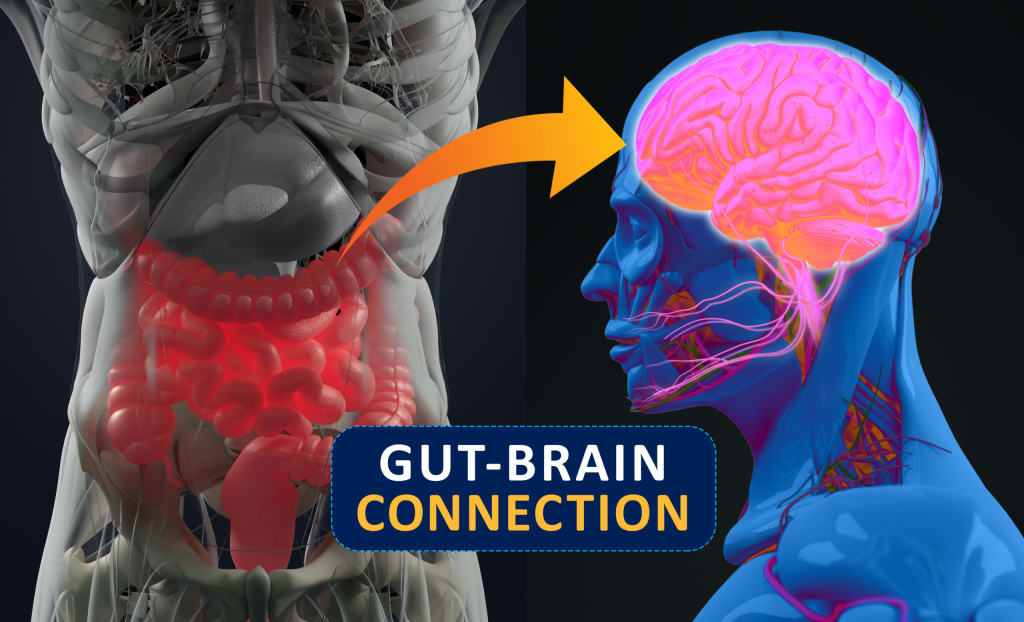The Mind-Gut Connection: How Your Gut Health Affects Your Mood
Unveiling the Surprising Link Between Your Gut and Emotional Well-being

Have you ever noticed that your mood can sometimes be influenced by how your stomach feels? This seemingly peculiar connection between our gut and our emotions is a fascinating area of scientific research. The mind-gut connection refers to the intricate relationship between our brain and our gut, and how the health of our gut can significantly impact our mood and emotional well-being. In this article, we will unravel the mysteries of the mind-gut connection, exploring the science behind it, sharing real-life examples, and inspiring you to prioritize your gut health for a happier, more balanced life.
The Gut: More Than Just Digestion
Traditionally, the gut was considered solely responsible for digestion and absorption of nutrients. However, recent scientific discoveries have shed light on the gut's profound influence on our overall health, including our mental and emotional well-being. The gut is home to trillions of microorganisms, collectively known as the gut microbiota, which play a crucial role in maintaining the delicate balance of our digestive system.
Imagine Sarah, a young woman who suffered from chronic digestive issues for years. She decided to prioritize her gut health by adopting a balanced diet and introducing probiotic-rich foods. As her gut health improved, she noticed a significant improvement in her mood and emotional stability. Sarah's experience highlights the transformative power of gut health on emotional well-being.
The Gut-Brain Axis: A Complex Communication System
The gut and the brain communicate through a bidirectional pathway known as the gut-brain axis. This intricate network involves the vagus nerve, neurotransmitters, immune cells, and chemical messengers, allowing constant communication between the gut and the brain. The gut microbiota also produce and interact with various substances that can influence brain function and mood.
Take John, a man who experienced high levels of stress and anxiety. He decided to incorporate fermented foods and prebiotic-rich foods into his diet to support his gut health. Over time, he noticed a significant reduction in his anxiety levels and an improvement in his overall mood. John's story exemplifies the impact of a healthy gut on emotional well-being.
Serotonin: The "Feel-Good" Neurotransmitter
One of the key players in the mind-gut connection is serotonin, often referred to as the "feel-good" neurotransmitter. Surprisingly, around 90% of serotonin is produced in the gut. Serotonin plays a crucial role in regulating mood, appetite, and sleep. An imbalance in serotonin levels can contribute to mood disorders such as anxiety and depression.
Consider Lisa, a woman who struggled with depression. Alongside therapy, she focused on healing her gut through a nourishing diet and probiotic supplements. As her gut health improved, Lisa noticed a gradual uplift in her mood and a reduction in depressive symptoms. Lisa's experience underscores the importance of a healthy gut for maintaining emotional balance.
Inflammation: A Culprit in Mood Disorders
Chronic inflammation in the body can have a detrimental impact on both physical and mental health. Inflammation in the gut can lead to increased permeability of the gut lining, allowing harmful substances to enter the bloodstream and trigger systemic inflammation. This inflammation can affect brain function, contributing to mood disorders such as depression and anxiety.
Imagine Mark, a man who experienced persistent gastrointestinal issues and chronic fatigue. After addressing his gut health through dietary changes and targeted supplementation, he noticed a significant improvement in his energy levels and a reduction in depressive symptoms. Mark's story highlights the role of gut health in alleviating inflammation and improving mood.
The Impact of Stress on the Gut-Brain Connection
Stress, whether acute or chronic, can disrupt the delicate balance of the gut-brain axis. The gut is highly sensitive to stress, and prolonged stress can alter the composition of the gut microbiota, compromise the gut lining, and impair digestive function. This, in turn, can affect mood and emotional well-being.
Consider Emma, a young woman juggling multiple responsibilities and experiencing high levels of stress. She incorporated stress management techniques such as meditation and regular exercise, alongside dietary changes to support her gut health. As her stress levels reduced, she noticed an improvement in her digestive symptoms and a greater sense of emotional stability. Emma's experience illustrates the profound impact of stress management on the mind-gut connection.
Nurturing Your Gut for Emotional Well-being
Cultivating a healthy gut is a journey that involves adopting lifestyle habits and dietary choices that support optimal gut health. Here are some inspiring strategies to prioritize your gut health and enhance your emotional well-being:
a. Eat a Balanced Diet: Include a variety of fiber-rich fruits and vegetables, whole grains, fermented foods, and probiotic-rich foods to support a diverse gut microbiota.
b. Reduce Inflammatory Foods: Minimize the consumption of processed foods, refined sugars, and unhealthy fats, as they can contribute to gut inflammation.
c. Manage Stress: Engage in stress-reducing activities such as yoga, meditation, deep breathing exercises, or spending time in nature.
d. Get Quality Sleep: Prioritize adequate sleep to support the restorative processes in your body, including gut health.
e. Stay Hydrated: Drink plenty of water to maintain optimal digestion and support the movement of waste through the gut.
f. Seek Professional Guidance: If you experience persistent digestive issues or mood disturbances, consult a healthcare professional who can provide personalized guidance and support.
In conclusion, the mind-gut connection reveals the profound impact of gut health on our mood and emotional well-being. By understanding and nurturing this connection, we can make informed lifestyle choices that support our overall health and happiness. So, prioritize your gut health, listen to your body's signals, and embark on a transformative journey towards emotional balance and well-being. Your gut has the power to positively influence your mind, allowing you to thrive in all aspects of your life.






Comments
There are no comments for this story
Be the first to respond and start the conversation.